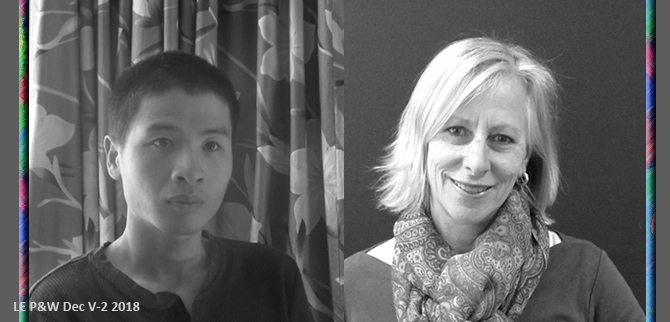Back from the Brink: Stories of Resilience, Reconciliation and Reconnection by Tim Chan with Sarah Chan, a preview by Anne M Carson
Anne M Carson’s poetry has been published internationally and widely in Australia. Massaging Himmler: A Poetic Biography of Dr Felix Kersten is forthcoming in 2019. Recognised in many poetry prizes including a longlisting for the 2017 Lane Cove Poetry Prize, she is also a visual artist, and essayist forthcoming in a US anthology, Art Matters. She serves as Director Arts on the Ondru Board and is post-graduate research student in Creative Writing at RMIT. www.annemcarson.com
Tim Chan is 23 years old and lives with autism, at the severe end of the spectrum. On top of sensory challenges, Tim is not able to speak and uses Augmentative and Alternative Communication (AAC). This is a simple yet controversial method, which activist Rosemary Crossley has devoted her life to developing, teaching and advocating for.
Tim’s method for communication is via a Speech Generating Device, a Litewriter, which converts Tim’s laboriously-typed communication on the keyboard to a voice which ‘speaks’ the words as he types them, enabling him to express himself and communicate with others. The AAC user is enabled to activate their muscles from increased proprioceptive feedback from the facilitator’s physical support – in Tim’s case, with familiar communication partners, just a hand on the shoulder
Tim has written a compelling autobiographical work; not only is his story dramatic and inspiring, but his method of telling that story through AAC is astounding. This is from the introduction to Back From the Brink:
I was 14 years old when I entertained serious thoughts about suicide. I was only prevented from carrying out my self-destruction because of my severe autism. Not having full control of my body, I didn’t know if I would end up in the morgue or permanently on life support or in a wheelchair. Already without speech, having huge hypersensory issues, movement difficulties, proneness to being overloaded, I didn’t want to add immobility and other challenges to my list in case I didn’t succeed in killing myself.
I wasn’t aware that I was depressed. At 14, in Year 8 at High School, I only got the sense that life was grinding me down. I was totally out of place in a mainstream high school where no one seemed interested in me, and people walked past me as if I didn’t exist. I was utterly powerless, had no speech, and was denied my usual means to communicate by typing with support. I felt the world would be better off without me.
*
What is it like to live with autism? From my own experience…, autism is … a life sentence of being trapped in a body that refuses to be controlled by your mind… When you try to talk, all you can manage is a high-pitched screech. When you try to read or listen to words, all you see or hear are their shapes or sounds which override their meaning. Within the prison of autism are other tortures; a nervous system so highly tuned that every sensation comes with unbearable intensity. New clothes scratch like steel wool, lamp-light burns into your eyes, or hands clapping are akin to the deafening roar of pistol shots from the firing range. You live in a state of constant alert, never at peace, in an inner world of chaos and disconnection while trying to fend off the onslaught of overwhelming sensory input. … the outer world can appear strange and terrifying without a ready point of reference. In addition, because you don’t have an easily accessible system of meaning, people and their behavior can be beyond comprehension, and …with no ready means of communication… you are isolated and confined to the confusion of your own contorted reality. It is hard to imagine a more fearsome ogre than living within autism’s stranglehold.
Over the years since dipping to the lowest levels of self-loathing and despair from repeated encounters with lack of understanding and discrimination, I have chosen … to get at the root of my problems, and to explore what sets my journey apart from others… I want to recount the crucial stages in my life which shaped me into the sum of who I am. … I want to examine my engagement with life in all its aspects. Lastly, to explore the kind of person I aspire to be, [and] the people… who have inspired me… one way or another.
It is not always easy to witness Tim’s story. Not only is it difficult to read of the agonies inflicted by his own nervous system – it’s also difficult to read of the discrimination he has suffered. These ordeals could have turned Tim bitter. Instead, they have wrought a deep compassion and a radar for stories of others who have been to the brink and, instead of falling, have transformed themselves. These stories are vital for us collectively as we build a more inclusive and compassionate culture.
I have had the immense privilege of working with Tim and Sarah, his mother and primary communication partner, to assist in shaping his work. We are currently looking for a publisher.
© Anne M Carson


